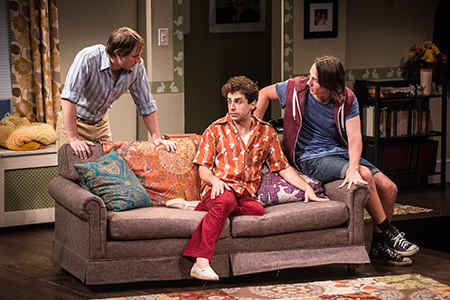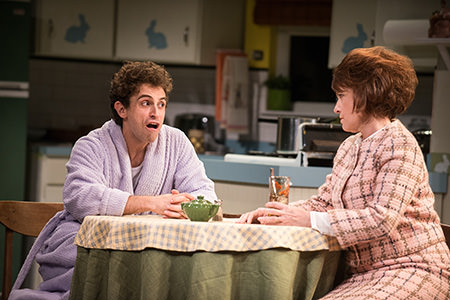Some plays don’t age well; they get dated but dusted off anyway. Some time-travel okay, and get mounted in modern dress. But rare is the work that—while still set in the period years ago when it was written—only now can be seen thriving in the very prime of its life. Such a play is Torch Song Trilogy, which has been given an immensely entertaining and compassionate new production directed by Michael Kahn at The Studio Theatre. There is no ‘Best Stroke of Genius Award’ in theater, but if there were, Kahn’s inspired choice to reignite Torch Song Trilogy would win in a walk.

This triptych of one-acts about gay love, loss, and longing by Harvey Fierstein was first produced Off-Off Broadway in 1978 and had a ground-breaking successful commercial run in the early 1980s (before same-sex couples were gossip-column celebrities, before gay marriage was remotely imagined). But it cannot be “contemporized”; there is too much period-specific detail (for instance its jaw-droppingly hilarious first-act pre-AIDS backroom scene). A playgoer could reasonably worry that this work was at high risk of seeming a museum piece, a cultural time capsule, its emotional shelf life expired. But Kahn knew better. He rightly recognized this is a play for today.
Yesterday I watched Torch Song come ablaze with magnitudes more humor and heart than ever before. (I get to say that unequivocally having three times seen the original New York production starring—as the tart-tongued downtown drag performer Arnold—Harvey Fierstein himself.)
Fierstein wrote Torch Song Trilogy to mend a heart broken by a recent breakup with a man he had not stopped loving—hence the title’s evocation of carrying a torch. Fierstein had achieved modest notoriety as a drag performer in Lower East Side club circles, and he wrote the lead role for himself (indeed the play opens with a touchingly funny monologue by Arnold as he puts on makeup and a wig). The character’s rhythms, diction, and wise-cracking wit are so thoroughly Fiersteinian that the play can’t really work unless the actor playing Arnold pays Harvey some respect.
All of which makes Brandon Uranowitz’s transcendent turn in the role so profound and astounding. Uranowitz gets the part’s clever text just as dextrously as Fierstein, flip mannerisms and all, but Uranowitz dives beneath the witty repartee—into the reservoir of hurt it rises up from—and brings to the surface an Arnold whose emotional arc Fierstein scripted brilliantly, but that Uranowitz now channels definitively. By the third-act scene with Arnold’s mother when Uranowitz opens the floodgates on that reservoir—no jokes now, the only cracks the ones in the wall that has dammed his enormous pain—we become witnesses to a depth of feeling so intrinsically human it has no name.
Torch Song Trilogy has been deservedly lauded for the way it treats love, loss, and longing as universals. It does through comedic drama what torch songs do through music. Yet over the years some have surmised it was written voyeuristically for straights such that gays could get a kick out of it, or written winkingly for gays with a nod to the ostensibly tender sensibilities of straights. That’s all moot now; that was last millennium; we live in a different era. This new production at Studio uncovers the emotional soul of a play that was presciently there all along but that only now, post-DOMA, can be seen and felt fully beyond what once quaintly sorted apart our hearts by “sexual persuasion.”
In the first act Arnold falls hard for Ed, who is bisexual (which Arnold disputes but which Fierstein simply posits). Ed dithers about declaring his love for Arnold and, as solidly and sympathetically played by Todd Lawson, his own wonderfully rendered emotional arc takes on genuine will-he-or-won’t-he suspense. The character could easily seem merely a foil for Arnold’s desperate projections, but Lawson’s Ed is a fully agentic partner in propelling the play’s affectional momentum, including in his sweet second-act scenes with Laurel (Sarah Grace Wilson), whom Ed falls in love with and marries.
The role of Laurel is perhaps the trickiest in the play. On the rebound from two prior romances with bisexual men, Laurel welcomes Ed’s ex Arnold and Arnold’s new lover Alan for what she expects to be a fun weekend in the country with her loving and faithful boyfriend Ed. Um, probably not gonna happen, and Fierstein’s depiction of Laurel in this inauspicious situation could easily come off as a contrivance. But as Wilson plays Laurel, with pitch-perfect credibility, the setup tickles us silly then leaves a lump in our throat.
Arnold’s formidable mother arrives in act three. The role of Ma (which I saw launch the career of The Golden Girls‘ Estelle Getty) is among the great parts in contemporary comedy for women whose faces wear well-earned lines. Gordana Rashovich plays the hell out of her, with a knockout range of comic timing and pure pathos. The scenes with her gay son that turn on her own widowhood so raise the emotional ante of the play that it’s as if gales of laughter simply must cease so we can take in Ma’s raw truth.
The cast is wonderfully rounded out by the appealing and eager Alex Mills (as Arnold’s model boyfriend Alan), the hip and energetic Michael Lee Brown (as a foster teenager, David), and the sultry Ashleigh King (whose chanteusey Lady Blues, accompanied on piano by George Fulginiti-Shakar, delivers some lovely torch songs composed by Eric Shimelonis).

The visual design—set (James Noone), lighting (Peter West), costumes (Frank Labovitz), projections (Adrian Rooney)—seemed at first glance kind of unremarkable and restrained. And then it hit me: This entire show has the uncanny effect of being not only authentic to the period but also a spot-on emulation of theatrical production values from the time. It’s very subtle, but it’s consistent with the insight and sensitivity that are evident throughout.
Will Torch Song Trilogy be as richly rewarding a theater experience ten, twenty, thirty years from now? No one can say. History has been moving in some mysterious and surprising ways lately, especially as pertains to social and political perspectives on gender and affairs of the heart. But trust me on this: Three decades ago, no one could have foreseen that Torch Song Trilogy would pack such a powerful wallop in 2013 that if tickets got any hotter they’d be flaming.
Torch Song Trilogy plays through October 13, 2013 at The Studio Theatre – 1501 14th Street, NW in Washington, DC. For tickets, call the box office at (202)332-3300, or purchase them online.






TRIOLOGY
IN AN APPROPRIATE PLACE
THANKS SO MUCH
COUNTING THE MOMENTS